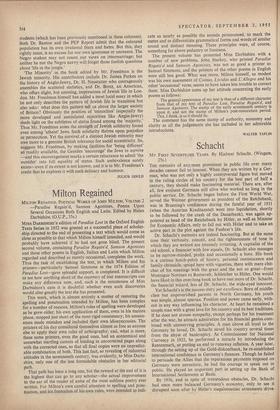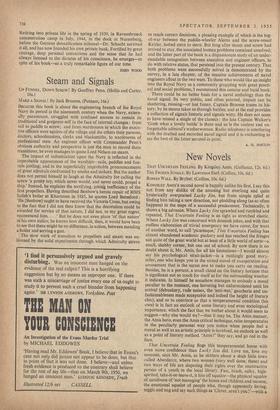Schacht
THE memoirs of any,man prominent in public life over many decades cannot fail to interest. When they are written by a Ger- man, who was not only a highly controversial figure but moved in the ruling circles of his country for the best part of half a century, they should make fascinating material. There are, after all, few eminent Germans still alive who worked so long in the public service. Dr. Schacht began before the First World War, served the Weimar government as president of the Reichsbank, was in Bruening's confidence during the fateful year of 1931 (when the Austrian Kreditanstalt went into liquidation, shortly to be followed by the crash of the Danatbank), was again ap- pointed as head of the Reichsbank by Hitler, as well as Minister for Economic Affairs, only to fall out with Hitler and to take an active part in the plot against the Fuehrer's life.
Dr. Schacht's memoirs are indeed fascinating. But at the same time their verbosity, conceit, and the righteousness of tone in which they are written arc intensely irritating. A capitalist of the old school, a financier with few equals, Dr. Schacht also manages to be narrow-minded, prolix and occasionally a bore. His book is a curious hotch-potch of history, personal reminiscence and family chronicle, spiced here with vignettes, there with mere chit- chat of his meetings with the great and the not so great—from Montague Norman to Roosevelt, Schleicher to Hitler. One would have liked in this over-long book to have met more of Dr. Schacht, the financial wizard, less of Dr. Schacht, the wide-eyed innocent.
Yet Schacht's is the success story par excellence. Born of middle- class but impoverished parents in North Germany, his youth was simple, almost spartan. Position and power came early, with- out in any way influencing his character. At heart he remained a simple man with a great love for his country and its best traditions. If he does not arouse sympathy, except perhaps for his treatment after the war, he attracts admiration for his financial genius com- bined with unswerving principles. A man above all loyal to the Germany he loved, Dr. Schacht saved his country several times from the abyss of bankruptcy. As Commissioner for National Currency in 1923, he performed a miracle by introducing the Rentenmark, so putting an end to runaway inflation. A year later, through the setting up of the Gold-diskontbank, he re-established international confidence in Germany's finances. Though he failed to persuade the Allies that the reparations payments imposed on Germany were unrealistic, he had the courage to speak out in public. He played an important part in setting up the Bank of International Settlements at Basle.
By 1936, and in spite of tremendous obstacles, Dr. Schacht had once more balanced Germany's economy, only to see it disrupted soon after by Hitler's megalomaniac armaments drive. Retiring into private life in the spring of 1939, in Ravensbrueck concentration camp in July, 1944, in the dock at Nuremberg, before the German denazification tribunal—Dr. Schacht survived it all, and has now founded his own private bank. Fortified by great courage, deep personal convictions and the sense that he had always listened to the dictates of his conscience, he emerges—in spite of his book—as a truly remarkable figure of our time.
JOHN WOOD



































 Previous page
Previous page